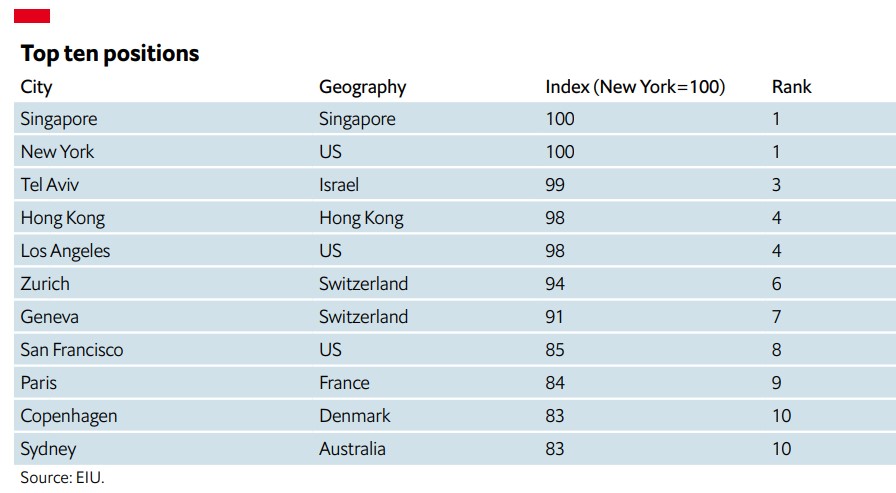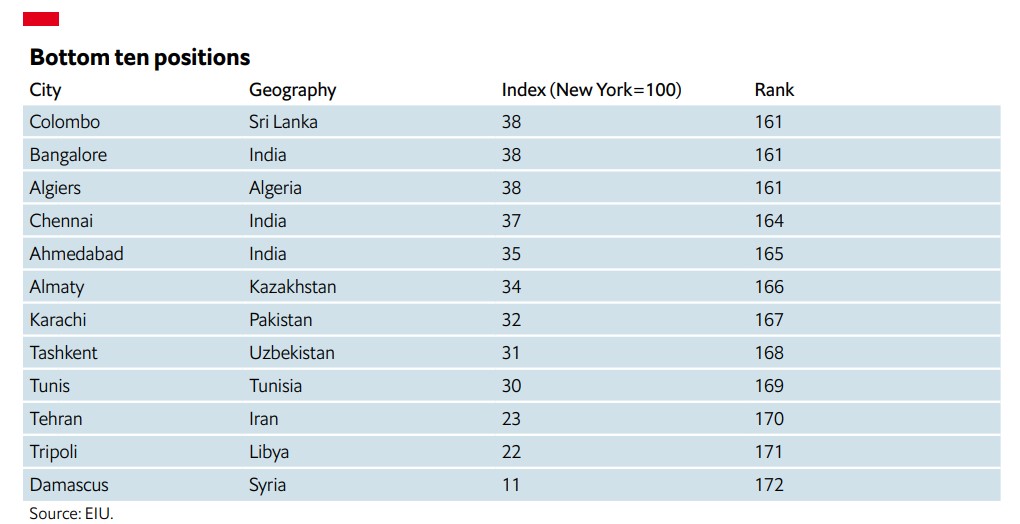Karachi sixth least expensive city; New York Singapore most expensive
December 1, 2022 07:16 PM

Pakistan’s largest city is the sixth least expensive city in the world, according to this year's Worldwide Cost of Living Index, released by the Economist Intelligence Unit (EIU).
According to this year's Worldwide Cost of Living Index, released by the Economist Intelligence Unit (EIU), the average cost of living is up 8.1% in 2022, owing to the Russian war in Ukraine and the lingering effects of the pandemic.
New York was the world’s most expensive metropolis in 2022, sharing the unwanted title with Singapore, as soaring energy prices doubled the inflation rate across the major global cities.
Last year’s leader Tel Aviv dropped to third, while Sydney snuck into the Top 10 and Moscow and St Petersberg in Russia scaled the rankings by as much as 88 places as sanctions and buoyant oil prices propelled prices higher, the EIU’s Worldwide Cost of Living report found.
Venezuela’s capital, Caracas, with its 132% price increase in 2022, was well down on the 2019 hyperinflation rate of more 25,000%, but remained too high to be included in the survey. The average inflation of 8.1% in local currency terms was still the highest in more than two decades of surveys, and up from 3.5% last year and 1.9% in 2020.

The cheapest cities in the rankings are Damascus, Tripoli and Tehran, reflecting these countries’ weak economies and currencies. Damascus and Tripoli, which are often at the bottom of the WCOL rankings, have seen only moderate local-currency inflation over the past year.
A stronger currency was also one factor driving cities up the rankings. Six of the eight highest climbers (after the two Russian cities) were US cities, led by Atlanta going from 42nd to 46th in the rankings of the 172 cities surveyed. The US currency has strengthened sharply against almost all currencies as the US Federal Reserve hiked interest rates and signalled more rises to come.

Cities in countries where their currency slumped featured among those dropping down the listing of most costly cities. Japan’s Tokyo and Osaka were among the 10 biggest drops, ending at 37th and 43rd respectively, down from 13th and 10th in 2021.
Stockholm and Luxembourg dropped the most, both losing 38 places to 99th and 104th. Damascus in Syria and Tripoli in Libya retained their slots as the cheapest cities surveyed.
Singapore’s placing at the top of the index was little surprise. The city-state was the equal-second most expensive city in 2021 and has been No 1 in eight of the past 10 years. This year was the first time the Big Apple has been ranked as No 1.
The three UK cities surveyed all dropped down the rankings, with London now 28th from 17th in 2021. Edinburgh came in at 46th, down from 27th, while Manchester was 73rd most expensive compared with 41st last year.
Australian cities generally edged up the rankings, with the harbour city rising from 14th last year to 10th spot in 2022. Melbourne moved up to 15th from 16th last year, while Brisbane was 32nd up from 36th. Perth bucked the trend, dropping two spots to 73rd.
The global surge in inflation had been gathering steam before Russia’s invasion of Ukraine in February caused disruptions to supplies of key commodities, particularly food. Subsequent sanctions on Russia prompted further surges in oil, gas and other energy prices.
The cost-of-living crisis is affecting most of the world, with several cities in this year’s WCOL survey suffering from very high inflation. In Istanbul, prices have risen by 86% in local-currency terms since last year, while they are up by 64% in Buenos Aires and 57% in Tehran. The highest inflation rate is in Caracas, Venezuela, where prices have risen by 132% in local-currency terms since last year.
Rising petrol prices produced the biggest single propellant to higher inflation. On average, a litre of the fuel was 22% more expensive in local-currency terms than a year earlier.
Gas and electricity prices were 29% higher in western European cities, or almost triple the average increase of 11% globally, as the region scrambled to find alternatives to Russian energy.
Solace for some of those increases came in “subdued” increases in the price of recreational goods and services. “[T]his may reflect softer demand as consumers focus spending on essentials,” the EIU said.
Short of some unforeseen calamity, the EIU predicts cost increases will ease in 2023 as higher interest rates remove some of the demand pressure and supply-chain blockages start to ease. China may remain a wildcard as its zero-Covid policy starts to fray.
The good news is that prices may be starting to ease in some countries as interest rates rise.
“Unless the war in Ukraine escalates, we predict that commodity prices for energy, food and for supplies such as metals are likely to fall sharply in 2023 compared with 2022 levels, although they are likely to stay higher than previous levels,” the report said. Global commodity prices should advance another 6.5% in 2023, but a drop in pace from the 9.4% recorded for 2022.






 20 passengers perish in Chilas bus plunge
20 passengers perish in Chilas bus plunge Daughters defend Bushra Bibi
Daughters defend Bushra Bibi Pakistani-origin woman laid off by Elon Musk gives emotional reaction
Pakistani-origin woman laid off by Elon Musk gives emotional reaction Pakistan's historic moon mission aboard China rocket blasts off
Pakistan's historic moon mission aboard China rocket blasts off The Great Indian Kapil Show: Astonishing per-episode fees of cast revealed!
The Great Indian Kapil Show: Astonishing per-episode fees of cast revealed! And they lived happily ever after! Ishq Murshid's last episode sparks joy among fans
And they lived happily ever after! Ishq Murshid's last episode sparks joy among fans




